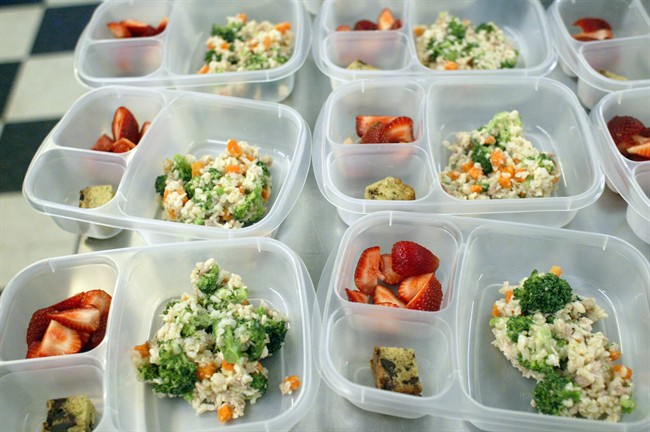Tossing and turning and waking up in the middle of the night? If you can’t get a restful night of sleep, American researchers suggest that you ought to look at what you’re eating throughout the day.

Ditching fibre and eating more saturated fat and sugar may explain why you end up with lighter, less restorative and disrupted sleep, according to doctors out of Columbia University Medical Center.
“Our main finding was that diet quality influenced sleep quality. It was most surprising that a single day of greater fat intake and lower fibre could influence sleep parameters,” Dr. Marie-Pierre St-Onge, an assistant professor at Columbia’s Institute of Human Nutrition, said.
READ MORE: Canadian doctor shares her tips for falling asleep and staying asleep
The New York City-based scientists worked with 26 healthy adults – 13 men and 13 women about 35 years old – for their research. Scientists gave the group controlled feedings, and they slept in a sleep lab for five nights, spending nine hours in bed from 10 p.m. to 7 a.m. The volunteers slept for about seven hours and 35 minutes on average per night.
It wasn’t until night three – after three days of controlled feeding – that sleep data was analyzed. Turns out, participants fell asleep faster after eating fixed meals provided by a nutritionist. These meals were lower in saturated fat and higher in protein and fibre.
It took them 17 minutes to fall asleep after eating the controlled meals compared to 29 minutes after eating meals they picked out for themselves.
When the subjects ate more fibre, they fell into a deeper, slow-wave sleep. Saturated fat interrupted that, while a higher sugar intake was tied to waking up more.
- ‘Super lice’ are becoming more resistant to chemical shampoos. What to use instead
- Solar eclipse eye damage: More than 160 cases reported in Ontario, Quebec
- Invasive strep: ‘Don’t wait’ to seek care, N.S. woman warns on long road to recovery
- Canadian man dies during Texas Ironman event. His widow wants answers as to why
READ MORE: Canadian docs study how saturated fat tampers with dopamine
Health officials have already warned that too much saturated fat in your diet could increase cholesterol levels and clog arteries. Saturated fat is found in animal protein, such as fatty cuts of steak, processed meats, bacon, sausages and hot dogs.
Sources of fibre include beans and lentils, brown rice and whole wheat pasta, and fresh fare, such as apples and celery.
“This study emphasizes the fact that diet and sleep are interwoven in the fabric of a healthy lifestyle. For optimal health, it is important to make lifestyle choices that promote healthy sleep, such as eating a nutritious diet and exercising regularly,” Dr. Nathaniel Watson, president of the American Academy of Sleep Medicine, said in a statement.
The organization wasn’t involved in the study.
READ MORE: Interrupted sleep just as bad for you as no sleep at all, study warns
St-Onge and her team say that their findings have tremendous health implications because poor sleep has already been tied to the onset of hypertension, diabetes and heart disease.
They suggest that diet-based recommendations play a role in helping people grappling with sleep problems, but that more research is needed to study this relationship.
Dr. Colleen Carney, a Ryerson University professor and sleep specialist, says that sleep is just as valuable as a healthy diet, drinking less and exercising more.
It’s a bit of a vicious cycle – sleep regulates our appetites because it balances out hormones.
If you aren’t sleeping well, your metabolism takes a hit, along with your eating routine. You could be encountering more cravings or even a loss of appetite.
READ MORE: The 41 most nutrient-dense fruits and vegetables
“What happens is the hormones stimulating appetite are higher, your satiety is lower and your regulation of feeding messes up. People crave saltier food and higher carbs. We see that in what food you pick when you want to snack,” Carney says.
St-Onge and her team’s full findings were published Thursday night in the Journal of Clinical Sleep Medicine.
Read the study here.
carmen.chai@globalnews.ca
Follow @Carmen_Chai




Comments